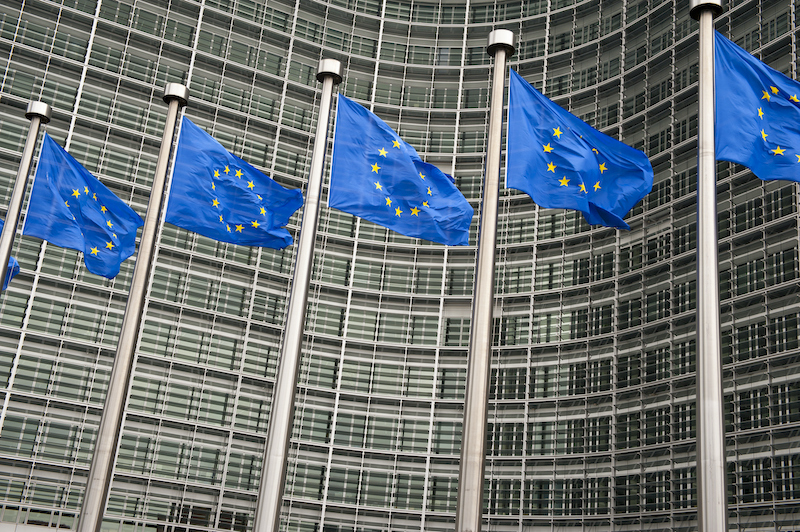
Political and constitutional constraints hinder the EU’s response to the economic crisis.
The coronavirus pandemic is shaking the European Union (EU) profoundly. It has struck at the heart of Europe’s weaknesses, the limitations in its laws, and the deep political and economic divisions the Union has been struggling with for at least a decade.
In the early days of lockdowns, member states closed borders and blocked the circulation of essential goods. The EU struggled to coordinate a health response, raising concerns that it was not capable of managing such a widespread public health crisis within its limited competencies. Yet that controversy has paled in comparison to the fight over Europe’s economic response to the crisis. A crisis that began as a threat to public health has produced a fundamental challenge to the Economic and Monetary Union.
The COVID-19 pandemic reopened old wounds from the sovereign debt crisis that a decade of eurozone policy had far from healed. The public was initially told that the coronavirus crisis is different and will be much worse—that its origin is external and its impact symmetric. But by now, no one denies that its socio-economic effects vary across member states, given their different fiscal abilities to support their respective economies. An EU response requires a solidarity that is simply not there.
Measures the EU has adopted during emergencies emphasize the trajectory European economic policy has taken over the last decade. EU law has changed during crises to support the centralization of executive powers, endowed with the discretion necessary to tackle an emergency and to maintain—to the extent possible—core political-economic premises upon which the European Monetary Union was built: balanced budgets and price stability, supported by a central bank with a limited mandate to conduct monetary policy. If the euro crisis challenged those premises, the COVID-19 crisis could upend them entirely.
Maintaining balanced budgets is simply illusory under current conditions. Even if the economic impact of COVID-19 is still hard to assess, it requires “far-reaching flexibility” in fiscal policy to support both European nations’ public health systems and their individual capacity to respond to the economic crisis. The European Commission therefore took the unprecedented decision to trigger the so-called general escape clause of the Stability and Growth Pact, which the European Council endorsed.
For the first time since Europe began coordinating its economic policy, member states will not need to comply formally with requirements to keep government deficits below three percent of gross domestic product (GDP) and government debt below 60 percent of GDP “for so long as is necessary.” If the Commission can still provide this flexibility within the framework of the Stability and Growth Pact, the benchmark against which member states and EU institutions will be coordinating their actions will differ from the customary “golden rule,” which requires that member states maintain deficits below 0.5 percent of GDP. Those who have a more positive reading of the possible impacts of this crisis—which are still hard to foresee—may see in this “far-reaching flexibility” the seeds for a paradigm shift in European economic policy.
At the same time, the European Central Bank (ECB) is again stretching its limited mandate to maintain financial stability. The ECB’s Pandemic Emergency Purchase Program (PEPP), a program to purchase sovereign and corporate debt, is the type of extraordinary monetary measures that has caused political and legal upheaval in the past. After a hesitant start, the ECB announced that PEPP will last as long as the COVID-19 “crisis phase” and will be used “in a flexible manner.”
Flexibility is the key here. The program may be revised “to the extent necessary to make its action proportionate to the risks faced” with the stated goal of ensuring the smooth transmission of monetary policy. The allusion to Gauweiler and Others v. Deutscher Bundestag is clear. In Gauweiler, the Court of Justice of the European Union ruled on the legality of the Outright Monetary Transactions program (OMT), deployed by the ECB in 2012 at the height of the euro crisis. The OMT, like PEPP, was an exceptional measure for an exceptional circumstance. Both programs push the boundaries of the ECB’s mandate. They make inroads into economic policy with dubious backing from the EU’s primary law—making PEPP as prone to a judicial challenge as OMT was in 2012.
Should such a challenge arise, the Court is likely to confirm the ECB’s broad discretionary powers and uphold PEPP. As long as the ECB’s interpretation of its mandate has the backing of the European Council, it is unlikely that the Court will stand in its way.
This possibility raises once more the question of whether courts are the institutions that should be deciding the scope of a mandate whose boundaries shift under the pressure of reactions to crises. Nevertheless, a debate over the legal limits of the ECB’s powers—including the possible revision of its mandate and the democratic legitimacy of the ECB’s actions—remains highly relevant. Although the ECB’s measures are praiseworthy for the effects they have produced, in the medium and long-term, these issues ought not be brushed aside merely because the ECB’s measures were adopted under urgent conditions.
Despite the challenges that the COVID-19 crisis is posing once again to the European Monetary Union, those who hope for a paradigm shift—pointing out the limits of current EU law and the need to revise the dogma of sound budgetary policy beyond the emergency “escape” routes—may inevitably see history repeat itself.
After a succession of failed attempts, the EU has made some progress to support the economy of the member states. Yet the deep political divisions between the member states continue to haunt the possible solutions on mutual assistance. The main conflict is over the possibility of transferring economic resources between member states, which is currently prohibited by EU law.
It is possible that, once the emergency has passed, Europe’s courts and political leaders will have successfully navigated the economic consequences left by the crisis and keep the EU’s current constitutional framework. And yet, following the COVID-19 crisis, the political costs of the EU’s pre-crisis legal restrictions may be too high. This crisis is likely to exacerbate the deep divisions within the eurozone and lead to unpredictable political consequences.
This essay is part of an ongoing series, entitled Comparing Nations’ Responses to COVID-19.




